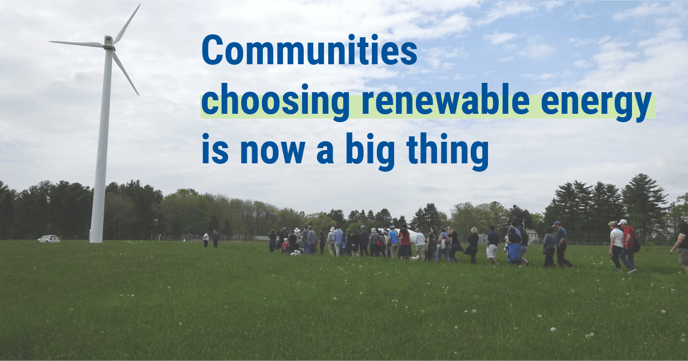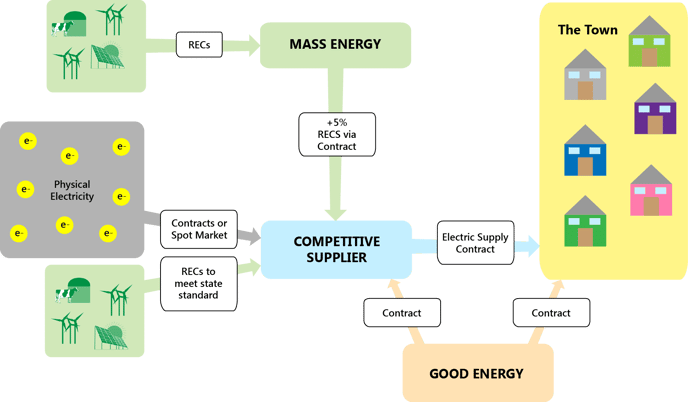Yaima Braga
Feb 25, 2019 4:46:55 PM
Communities choosing renewable energy is now a big thing

Massachusetts is one of a few states allowing cities and towns to aggregate consumers for the purchase of electricity. In the last year, we have seen a good number of communities take the opportunity to do just that in ways that are bringing on significantly more renewable energy than required by state law. The first to commit was Melrose, followed by Dedham. Both started their programs in January 2016. But this year, many more are following suit in the world of “Green Municipal Aggregation” or “Community Choice Energy”. This summer, programs are starting in Arlington, Brookline, Cambridge, Lexington, Somerville, Sudbury, and Winchester.
In the cases of Arlington, Somerville, Sudbury, and Winchester, the communities have chosen to have electricity supply that includes five percent (5%) more Class 1 energy (e.g. wind and solar) than the state’s requirement of 12%. When you do the math, it’s actually a 42% increase in the amount of renewable energy.

Here at Mass Energy, we are proud to be the suppliers of that incremental 5%. We’ll be transferring the “renewable energy certificates” for those resources to the supplier selected by the towns with the capable support of their consultant, Good Energy. The supplier serving each town will be responsible for complying with the state’s requirement.
Green Municipal Aggregartion Model:

Brookline is a special case indeed. They are going 25% above state law, to 37% in 2017! And again, we’ll be providing the requisite number of renewable energy certificates. We’re excited by this. To meet that demand, we have to buy more green power from area generators. When we increase demand for wind and solar, we can turn the spigot down on fossil fuels.
In 2017, we expect more communities to join this movement – Bedford, Gloucester, Newton and more. Active citizens groups are organizing in places like Amherst, Boston, Northampton and Worcester. Generally, this is great news because the state’s Renewable Portfolio Standard is too low. It says that electricity suppliers must increase their percentage of renewable energy by 1% per year. As mentioned, the 2017 requirement is just 12%. At that rate, we will not have enough zero emission energy to reduce carbon emissions enough to prevent a whole lot of damage from climate change. We are advocating for a significant increase in the RPS from 1% to 2% or 3%, but in the meantime communities can take their own actions. The communities listed above are all five years ahead of their neighbors.
Jotting down some figures on the back of an envelope, we think that community choice energy programs will boost renewable energy demand in Massachusetts by 5-10% overall by 2020. On top of the state mandate, that is extraordinary.
Generally, the cost of adding 5% more renewable energy is about $15 per year, or a nickle per day. Some have asked whether it’s right for a city or town to impose that cost onto ratepayers. But in fact, state law requires community aggregations to give every consumer a thirty-day “opt-out” period and also allow consumers the right to opt-out an anytime thereafter without penalty. So we see it as a pro-consumer way to push our grid into the right direction. If someone wants to save $15 per year, they can easily “opt-down” or even “opt-out”. And for consumers who want 100% renewable energy, they can just as easily “opt-up”.

Speaking of 100% renewable energy, we note that some communities have been tempted to run with products that sound great but are not. The thing is that when we purchase a renewable energy certificate, we expect to have it an impact on the grid – increasing demand for wind and solar and reducing demand for fossil fuels. But even though all kinds of renewable energy generators produce certificates, some just are not worth buying. Example #1. Texas wind projects are very strong economically because their costs are lower than what they can earn without the certificate. So why buy the certificate? Example #2. A hydro project in New England has been around for a hundred years and there is no state requirement to build more “old hydro”. Again, it earns more revenue without the certificate. So why buy the certificate?
We applaud the communities that have chosen to go beyond the state’s portfolio standard the right way – by sticking to projects that qualify for the Class 1 standard. That is how we get the job done. If you live in a community debating whether to do aggregation, ask what kind of renewable energy they are talking about.
We have also heard some skeptics say that communities can reduce carbon emissions more cost-effectively in other ways, such as through energy efficiency. We could not agree more, which is why we sit on advisory committees in both Massachusetts and Rhode Island to push for strong efficiency programs. But we are hearing talk about saving energy at the local level more than we are seeing results. Furthermore, at the end of the day, even if we dramatically reduce energy consumption as we should, we should be displacing fossil fuels with renewable energy. There is no credible plan anywhere for meeting our carbon reduction goals (i.e. 80% below 1990 levels by 2050) without a lot more renewable energy.
At all levels - federal, state, local, and personal – we have to Make the Switch!
P.S. Unfortunately, current Rhode Island law has too many procedural hurdles that make creating a municipal aggregation plan difficult. So, we at People’s Power & Light helped write legislation to enable aggregation as the law originally intended. The bill passed in the House and was recommended passage by the Senate Commerce Committee, but wasn’t able to reach the Senate floor for a vote before the abrupt close of the session in June. We hope it will earn passage when the General Assembly goes back into session this fall, on September 19th. . If not, then we think it stands an excellent chance next year.
Learn more about House bill 5536 and contact your legislator and to encourage passage at www.ripower.org/aggregation
Related Posts
Green Power at Lower Cost: Municipal Aggregation is a Huge Success in Massachusetts
As recently covered by the Boston Globe, Green Energy Consumers is excited to present our new report on the great...
Larry Chretien & Mikaela Hondros-McCarthy
Jul 2, 2022 10:20:21 AM

Comments